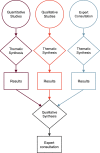Determinants of Self-Stigma in People with Parkinson's Disease: A Mixed Methods Scoping Review
- PMID: 34842199
- PMCID: PMC8925108
- DOI: 10.3233/JPD-212869
Determinants of Self-Stigma in People with Parkinson's Disease: A Mixed Methods Scoping Review
Abstract
Background: Self-stigma in people with Parkinson's disease (PD) can substantially impact quality of life and possibilities for social participation. An integrative analysis of determinants of self-stigma has been lacking.
Objective: We sought to explore which complementary insights from qualitative and quantitative studies, as well as from expert consultation, could be gained.
Methods: An established mixed methods study design was employed to first conduct a mixed methods scoping review of published qualitative and quantitative literature, and then consult with experts to arrive at an exhaustive list of determinants of self-stigma after a thematic synthesis.
Results: A total of 87 unique determinants of self-stigma were identified. Quantitative studies and expert consultations mainly identified personal determinants of people with self-stigma (e.g., age, anxiety, or apathy). In contrast, qualitative studies identified social situations associated with self-stigma (e.g., joint meals of people with typical PD with others). Notably, self-stigma of people with PD was found to be particularly salient in unfamiliar places, at the working place or in contact with people without PD. Across methods, cognitive impairment, tremor, and abnormal walk and unsteady gait, respectively, were associated with self-stigma.
Conclusion: The mixed method study design yielded complementary insights, but also factors commonly associated with self-stigma across methods. Future prioritization exercises may gain further insights into self-stigma of people with PD. Facilitating social encounters by both addressing needs of affected people and raising knowledge and public awareness may improve quality of life in people with PD.
Keywords: Parkinson’s disease; disability and health; international classification of functioning; review; shame; social discrimination; social stigma.
Conflict of interest statement
The authors have no conflict of interest to report.
Figures







References
-
- Parkinson J (2002) An essay on the shaking palsy. 1817. J Neuropsychiatry Clin Neurosci 14, 223–236; discussion 222. - PubMed
-
- Nijhof G (1995) Parkinson’s disease as a problem of shame in public appearance. Sociol Health Illn 17, 193–205.
-
- Goffman E (1991) Stigma and social identity. In Stigma. Notes on the management of spoiled identity, Goffman E, ed. Simon & Schuster, New York.
-
- Link BG, Phelan JC (2001) Conceptualizing stigma. Annu Rev School 27, 363–385.
Publication types
MeSH terms
LinkOut - more resources
Full Text Sources
Medical

